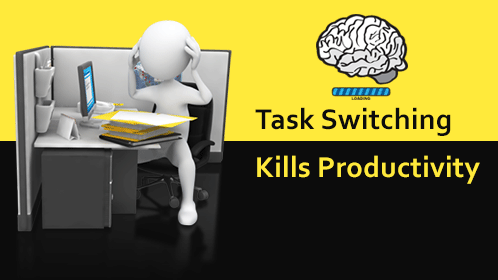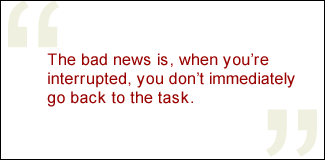Interruptions are the real productivity killer
Many of us stay late at office, work on weekends and even on holidays. It's not because there is too much work to be done, it's because we are not getting enough done at work. The major reason behind this is interruption.
When are we most productive?
Just give a thought and try to connect dots with following and see isn't this true.
- At night, we are most productive as there is no one to interrupt.
- In early morning, there is silence and it's peaceful. We are most productive again.
- We are in a room alone and if there is no one to disturb, again we are productive.
- We in plane so offline. We start work on a presentation and get maximum outcome as phone does not ring.
These all are the times when we are alone and no one else is around to disturb us and it's not just the coincidence that we are most productive during these instances.
How and where these interruptions kill productivity?
- We are in office and chattering.
- We are working and response to an email or a phone call is required.
- Taps on the shoulders which invite us to a small harmless get-together, but actually are corrosive to productivity.
- Birthday and other celebrations.
- Planned and unplanned meetings.

source: jonaslind
Actually there are many more. On a usual day, a person works for 45 minutes and is required to join an urgent discussion. Again he comes back to work , work for 30 more minutes, then it's a lunch time. After this there is a meeting scheduled at 2 pm.
And at 5, when that person looks back, he sees nothing productive is done. Now, that person needs to stretch and stay till late to finish the work. You can not get things done when you constantly going start, stop, start stop. Again context switching takes time and hence many switches in context consumes a lot of additional time.
If a person "Steve" has to do two tasks "A" which is expected to take 4 hours and "B" which is again of 4 hours.
Case1:
Steve starts working on task "A" at 9 AM and finishes it by 1 PM.Steve takes a lunch break at 1 PM and comes back to work at 2 PM.Steve starts working on task "B" at 2 PM and finishes task by 6 PM.Case2:
Steve starts working on task "A" at 9 AM.Steve is required to attend a 15 minutes meeting at 10 AM.Steve comes back to work and try to recollect which other things are
required to be done for Task "A"Steve starts working on task "A" at 10.30(15 minutes consumed in context
switching).Steve's friend comes to his desk at 11 and they chatter for 15 minutes.Steve again continue working on the task at 11.15(again 2-3 minutes or more
required to switch back the original context) and he works for next 60
minutes.Steve got an email from his boss which is to be responded quickly. Steve
respond to that. Now, its 12.45 PM and it's lunch time is at 1. So, Steve
thinks of continuing work at 2 PM, post lunch.Steve continue to work on task "A" and due to other interruptions is able to
complete this task by 5 PM instead of 1 PM.AND NOW STEVE NEEDS TO WORK LATE OR ON WEEKENDS TO COMPLETE THE REMAINING TASKS
So, it's the interruption which is responsible for long hours not the actual work

source: media.gallup
Alone Zone:
Long stretches in the alone time( when you are alone) is when you are most productive. As explained earlier, night and early morning times are most productive for us we are alone and there is hardly anyone to disturb us. This is the time where you don't have to switch mind on various tasks.
Getting into this zone takes time and require avoiding interruptions. It's like REM sleep. And your alone zone does not required to be in the wee hours. You can setup any rule at work which helps you to have alone zone.
These rules might be:
- No meetings or discussion between 10 AM to 2 PM(at-least for half day) except lunch.
- No meeting on Thursday(or any of the day)
- Meetings at the start or at end of t he day to avoid interruption in between the day.
- Don't talk on Wednesdays.
- Or any other trick which helps you and your colleagues to get alone time.
A successful alone-time period means letting go of communication addiction. During this time, give up instant messages, phones calls, e-mails etc. Just shut up and continue working.
At the end of the day you will be surprised to see how much work gets done.
If you liked this post, please upvote, repost and follow @qagiri
Here is a link to a research on the cost of interruptions. They say unnecessary interruptions cost U.S. businesses $588 billion per year, so they seem to agree with you :-)
Great insight @idealist.
I handle an entire project account. Few months, I noticed how interruptions were impacting producivity.
Then we decided to make a Sprint calendar which already had list of meeting that were required to be done in a 15 days sprint. No extra meetings untill something is business critical. It helped us a lot :)
Agreed with you. I find that I am more productive in the office after 5pm when there is no one to bother me.
@positivesteem
Same happens with me. Now, I started coming 1 hour early to get more time for alone-zone. :)
Very good post. Keep it up @qagiri
Thanks @funnyman!!
Many types of work, however, as well as all the usual life solutions require many, often unrelated, disparate tasks and quickly switch between them.
Ability to work in a multitasking mode is very useful. And it can be learned.
It helps planning and partitioning of large tasks into smaller ones, although it is not always possible: the plans violated surprise and a big problem has such interdependence that decompose it into a molecule simply useless ...
But you have to try to squeeze their working day ...
Much of this depends on leadership: a lot of managers do not take into account the pace and work attitude of subordinates, knocking them "urgent" requests and tasks.
Многие виды работы, впрочем, как и вся обычная жизнь, требуют решения многих, часто не связанных, разрозненных задач и быстрого переключения между ними.
Умение работать в таком режиме многозадачности очень полезно. И этому можно научиться.
Очень помогает планирование и разбиение крупных задач на более мелкие, хотя это не всегда возможно: планы нарушаются неожиданностью, а крупная задача имеет такие взаимозависимости, что разлагать её на молекулы просто бесполезно...
Но как то надо стараться сжимать свой рабочий день...
Во многом это зависит и от руководства: много руководителей не учитывают темп и рабочий настрой подчинённых, сбивая их "срочными" запросами и заданиями.